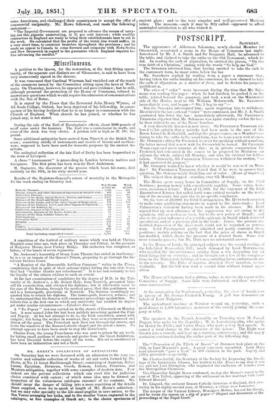POSTSCRIPT.
SATURDAY.
The appearance of Alderman Salomons, newly elected Member for Greenwich, occasioned a scene in the House of Commons last night. Introduced by Mr. J. A. Smith and Sir Benjamin Hall, he advanced to the table, and claimed to take the oaths on the Old Testament; which he did. In reading the oath of abjuration, he omitted the phrase, "On du) true faith of a Christian," ending with the words "So help me God."
The SPEAKER informed him, that having omitted to take the oath in the customary form, he must retire below the bar.
Mr. SALOMONS replied by reading from a paper a statement that, having taken the oaths binding on his conscience, he now claimed to take the oath of abjuration as a matter of form, and to declare his property qualification. The cries of" order" were incessant during the time that Mr. Salo- mons was reading this paper : when he had finished, he pushed it on the table, retired beyond the gangway, and took a seat on the Ministerial side of the House, next to Sir William Molesworth. Mr. SALOMONS immediately rose, and began—" Sir, I beg to say "-
But the SPEAKElt interrupted him ; again requiring him to withdraw. He retired to the bar ; cries of "order" were continued, and Mr. J. A. Smith conducted him below the bar : immediately afterwards, Sir FREDERICK THESIGER objected that Mr. Salomons was again standing within the bar ; he then retired to one of the Peers' benches.
A very disorderly discussion now arose. Sir FREDERICK MESMER ad- hered to his opinion that a mistake had been made in the ease of the Baron Lionel de Rothschild, and that the proper course, on a Member's re- fusing to take the oaths in the usual form, was to issue a new writ at once. Mr. OSBORNE calling Sir Frederick to order for speaking without a motion, the latter moved that a new writ for Greenwich be issued. Sir CHARLES WOOD expressed great surprise at this ; as in private conversation Sir Frederick had concurred in the course to be proposed by Ministers—l0 adjourn the whole subject till Monday, and take the interval for delibe- ration. Ultimately, Sir FREDERICK THESIGER withdrew his motion, "as it had answered its purpose." Mr. OSBORNE wanted to know whether it would be renewed on Mon- day? Sir FREDERICK THESIGER feared that if he were to answer that question, Mr. Osborne might think him out of order. (Roars of laugh(er.) The subject then dropped—standing over till Monday.
The House spent many hours in Committee of Supply, on the Civil Services ; passing money with considerable rapidity. Some votes, how- ever, occasioned debate. That of 11,500/. for the expenses of the Irish Encumbered Estates Act called forth some critical remarks on the work- ing of the measure, but gave rise to no specific conclusion.
On the vote of 50,000/. for Civil Contingencies, Mr. Huff took occasion to make some qualifying statements in regard to the slave-trade ; Lord Palmerston's statement having been made in his absence. Mr. Hutt argued that the new efficiency of the suppression was not owing to tire squadron, still as useless as ever, but to the new policy of Brazil ; and also to the joint influences of a terrible epidemic in Brazil which deterred speculators, and of a previous glut in the trade : hence, the present un- doubted depression of the slave-trade could not be regarded as perma- nent. Lord PALMERSTON partly admitted and partly contested these positions ; mainly relying on the fact that the price of slaves in Brazil has doubled, which shows the pressure of a demand there. Some few more remarks passed ; but Mr. Hutt met no substantial answer.
In the House of Lords, the principal subject was the second reading of the Inhabited House-duty Bill ; much damaged by Lord MONTEAGLE, who recalled the inconveniences arising front a tax depending not on fixed things but on raise/ion; and he brought out a few of the complica- tions in the Ministerial shillings of taxes, entailing future embarrassments to the revenue. The Duke of ARGYLL attacked direct taxation, as un- workable. But the bill As-as read a second time without formal oppo- sition.


























 Previous page
Previous page